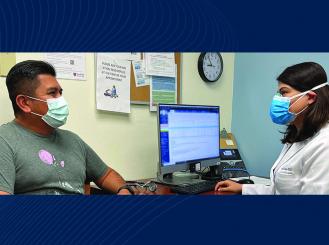Mar 08, 2022
By Jimmy O’Hara, Conquer Cancer
Surbhi Sidana, MD, of Stanford University School of Medicine, is advising a patient—whose multiple myeloma has relapsed—on whether to enter a clinical trial.
Patients with hematologic malignancies like myeloma, which is linked to low overall survival rates, can often reach better long-term outcomes from clinical trials versus standard treatment. However, many patients may have concerns about how clinical trials will affect their quality of life and add financial burdens not typically covered by insurance.
“While clinical trials are pivotal to move the field of cancer research forward, only 5% of adult cancer patients participate in clinical trials due to several barriers to enrollment and patient concerns,” said Dr. Sidana. “While there are several studies evaluating barriers to clinical trials, there is limited data on the lived experience of patients participating in clinical trials compared to patients receiving treatment outside of trials.”
To help guide patients as they make major decisions about treatment, Dr. Sidana studied how patients experience and perceive quality of life and care while participating in clinical trials and now works to address structural roadblocks to clinical trial enrollment.
Centering Patient Perception
Using support from a 2017 Young Investigator Award (YIA) funded by Conquer Cancer, the ASCO Foundation, Dr. Sidana launched her first prospective clinical study to help fill this gap in research. She and her team evaluated responses from patients with myeloma or lymphoma who were participating in trials to better understand how they experience quality of life compared to patients on standard lines of care. Dr. Sidana’s findings may help alleviate patient concerns about clinical trials and quality of life.
“We observed that patients participating in clinical trials experience a similar quality of life over time as patients being treated outside of clinical trials. This was reassuring to see,” said Dr. Sidana. “Such data can be helpful in educating patients and cancer care teams, as well as highlighting the concerns of patients participating in clinical trials, so we can work on improving those in the future.”
Her research revealed that financial toxicity remains a major barrier to trial enrollment and completion. Clinical trials often require frequent visits to the cancer center, which can be taxing for patients accruing the costs of transportation, meals, lodging, and pay gaps from missed work. Such financial burdens are affecting patients regardless of their participation in trials.
“While most patients were able to get the cancer care they needed, a significant proportion of patients, both on clinical trials and those treated outside of trials, reported having to make other financial sacrifices due to treatment. It was sobering to learn that,” said Dr. Sidana. “Now, when I am considering whether to open a trial, I consciously focus on whether the trial provides coverage for meals, travel, and lodging for patients. I’m also mindful about making sure our patients have a scheduled visit with our social worker to evaluate and address any potential concerns.”
Research Collaboration
Beyond benefiting patients enrolled in clinical trials, Dr. Sidana’s work also helps accelerate novel drug development. She collaborates with investigators to evaluate patient experiences with new and promising treatments being tested in trials, such as CAR-T cell therapy and stem cell transplants. Teamwork helps Dr. Sidana tailor treatment plans for patients who need novel treatment in clinical trials to survive.
“The YIA gave me the opportunity to collaborate with other investigators at my institution who focus on patient-reported outcomes; this collaboration has been fruitful and led to work beyond my YIA study,” said Dr. Sidana.
Empowering Patients
As Dr. Sidana’s patient decides on next steps to treat his myeloma, she tells him about her YIA study. Together, they discuss how her research shows that patients enrolled in a clinical trial experience a similar quality of life to those treated with standard care.
Her patient enrolls in the clinical trial.
“I think this discussion provided him with more data and context to make his decision,” said Dr. Sidana. “He is now several months into treatment and is doing great. He mentions that he has an excellent quality of life and is back to work full time. This has been so gratifying for me.”

